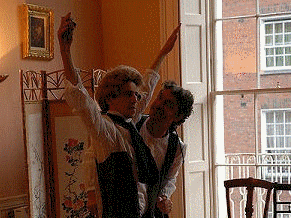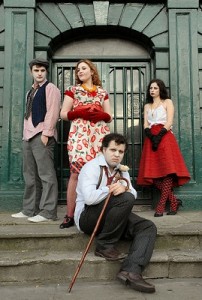John McKeown, The Daily Mail (Friday 14th March, 2008) ✮✮✮✮✮
Verdict: A spicy Italian Lunch.
Opera, however glorious, can sometimes be tiring to sit through. But writer/director Alice Coghlan has produced a trim abridgement of Leoncavallo’s Pagliacci, a firey tale of a troupe of clowns torn apart by adultery and murder, with only piano accompaniment, that doesn’t stint on its most famous sequences.
Of these the aria Vesti la Giubba – put on the costume – a favourite of Pavarotti’s – is probably the most well-known. Canio (Ralph Strehle) the clown has just discovered that his wife Nedda (Emer Barry) is in love with someone else. But if the show is to go on, he must tuck his shame behind a clown’s mask. With his macho possessiveness and his violent temper, Canio is really the villain, but Strehle’s flexibly muscular tenor persuades us that brute though he is, his love for Nedda is real.
What is especially good about Emer Barry is the range her versatile soprano voice encompasses. We get the girlish delight with which she taunts the hunchback Tonio (Welshman Rhys Jenkins.) He’s smitten by her charms but intent on revenge when she laughingly rejects him. And in a lively duet with lover Silvio (Simon Morgan), we get all the tremulous eagerness of growing passion.
What makes the range of voices, from Jenkins soup-plate rattling tenor to Morgan‘s impetuous baritone, particularly appealing is Alice Coghlan’s pungent translation, which releases all the tempestuousness of the story line like a controlled explosion. She takes some inventive liberties. The full-stage version requires a chorus of villagers watching the show. Their place is taken here by a bad-mannered couple sharing a mobile and excitedly wondering what’s happening on stage. This is a lively enhancement of the ‘play within a play’ aspect of the opera. This singing, chattering, commenting couple give the show a sharply contemporary feel.
Miles Lallemant provides lively piano accompaniment for this hour of unbridled passions. It’s a show that should charm opera sceptics and delight the faithful.
Michael Moffat, The Irish Mail on Sunday (Sunday 16th March, 2008) ✮✮✮✮
Tragic tears of a clown are a sheer joy to behold.
The Wonderland company is one of the most interesting young groups working in Ireland. At last year’s Dublin Fringe Festival, they gave us a sparkling Miser by Moliere and here, led by director Alice Coghlan, they do a smashing version of Leoncavallo’s one-act opera Pagliacci.
Using imaginative direction of her seven singers, Coghlan overcomes cramped surroundings and the difficulty of sound balance in a small room. Inevitably the accompanying piano occasionally competes with the singers but, in general, the very demanding piano part was played with great sensitivity by Elaine Brennan.
The two singers who form the chorus and audience for the harliquinade play-within-a-play are seated among the general audience. They also make a nice comic bow to the behaviour of actual theatre-goers, arriving late and not switching off their mobiles.
Pagliacci is a blend of realism and theatre in which the harliquinade, with tragic consequences, mirrors the story of Canio and his unhappy wife Nedda, who has a secret lover.
Emer Barry, originally understudying the role of Nedda took over at short notice but you would never guess it. She has a beautifully controlled voice, a good dramatic sense, and her change of style to a light touch that brings out the comic possibilities in the role of Colombina in the harliquinade, is particularly good. One of the highlights is her scene with lover Silvio (Simon Morgan), who matchers her vocally and dramatically.
Rhys Jenkins, as the lascivious Tonio, has a rich baritone, and he launches the opera, moving among the audience with a powerful rendition of the prologue. One of the pleasant aspects is the strength in the minor roles with Wojciech Smarkala as Beppe. Ralph Strehle as Canio gets the opera’s big aria, Vesti la Giubba, the song of the broken-hearted husband as he dons the motley of the clown for his performance in the stage show.
Coghlan has provided a literate translation, and the diction, often poor in opera, is generally excellent. There’s no reason why problems of balance can’t be worked out as the show settles down.
Metro (Thursday 13th March, 2008) ✮✮✮✮
Given that Pagliacci could well be considered one of the most well-known operas – its most popular aria Vesti la Giubba, became the first ever recording to sell over a million copies in America – it would seem that Bewleys along with Wonderland Productions, are intent on opening up the genre to the masses.
There is something both exclusive and embracing about opera, exclusive in that it is generally in a foreign language, yet embracing in that, no matter what your linguistic skills, once performed few could fail to understand the emotion. The language problem is removed here to some extent, as the majority of this production is in English, although how much clearer that makes it is debatable; there is something disconcerting about a single syllable lasting more than 30 seconds. And the emotion is crystal sharp, almost cutting in some places, particularly during the heart stopping Vesti la Giubba.
The plot is your typical mix of betrayal, jealousy and murder – in fact writer Ruggero Leoncavallo faced plagiarism charges after its release due to its similarity to another work. Canio, played superbly by Ralph Strehle, is the head of a troupe of clowns and suspects his wife and fellow performer, Nedda, is cheating on him.
Emer Barry’s Nedda is wonderfully cheeky and playful and her lover Silvio, played by Simon Morgan, is perfectly devoted and lovelorn. Rhys Jenkins plays Tonio, the fool, whose interaction with the audience which includes singing to and sitting with them, brings a fun element although at points verges on the pantomime. There are two ‘audience members’ who are seated with us civilians who shout and whoop at appropriate moments that are a far more welcome quirk.
The Dubliner (Tuesday 4th March, 2008)
Get thee to Bewleys.
A star is born… in Bewleys.
This afternoon Emer Barry, took to the stage of Bewleys café theatre for the first preview of Pagliacci, or the Clowns, a marvellous new opera. Barry excelled in the role, and is likely to – deserves to, anyway – receive rave reviews for her performance. But she is not the only reason to see this quirky production.
The whole show – the first time that an opera has been produced on the tiny Grafton Street stage – is another triumph for young English director Alice Coghlan, whose production of Moliere’s Miser was one of the highlights of the Fringe Festival last year.
Funny, poignant and beautifully sung, Pagliacci is going to be a hit.
And tomorrow’s performance is already sold out.
Back to Pagliacci Production Details Read More Wonderland Reviews
 A new version of Molière’s classic comedy. Translated, Written & Directed by Alice Coghlan. Performed in The James Joyce Centre as part of the Dublin Fringe Festival 9th-23rd September 2007,
A new version of Molière’s classic comedy. Translated, Written & Directed by Alice Coghlan. Performed in The James Joyce Centre as part of the Dublin Fringe Festival 9th-23rd September 2007,


